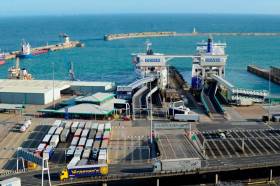Displaying items by tag: Record Freight
Port of Dover Reports Record Freight for Fifth Consecutive Year
#FerryNews - The UK's busiest ferryport, Port of Dover handled 2,601,162 lorries in 2017 up on the previous record by almost 10,000 units.
According to Multimodal News, this brings the total increase over the last five years to just under 650,000 units or 33%.
The Port of Dover stated that these figures underline the need for a post-Brexit trade deal that ensures continued traffic fluidity at this crucial export/import gateway which handles up to 17% of the UK’s entire trade in goods worth up to an estimated £122 billion last year. As also Europe’s busiest ferry port, there remains no substitutable capacity elsewhere in the UK to handle Dover’s trade volumes.
The recent year-on-year increases in freight traffic through the Port and continued growth projections further highlight that this key trade route connecting Ireland, the UK and the rest of Europe is vital to the UK’s economic prosperity as well as the rest of the EU.
Like the Port of Dover, the Port of Calais is expecting to confirm record freight traffic this year, with 2 million heavy goods vehicles passing through in 2017.
Forecast growth in freight traffic on both sides of the Channel in the coming years proves that the Dover / Calais route, the shortest and most economical route, remains a strategic choice for the transport and logistics industry.
It is essential that this traffic flow is maintained and that the on-going discussions between Europe and Great Britain over Brexit ensure the route’s durability.
Source: Analytiqa





























































